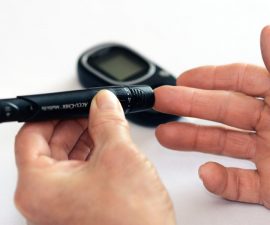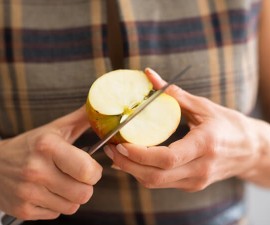It’s normal to feel thirsty when you don’t drink enough water, during hot days, or after you have powered through a strenuous workout. About 70 percent of your body weight is water. Thirst is natural signal of when your body is running low on water. But if you have diabetes, it may not relieve even though you constantly refill your cup – why? There are some reasons of why diabetics can get so thirsty!
Causes and risk factors of diabetes
Diabetes is a condition of when the body loses its normal ability to process glucose for energy. Insulin plays a key role to help process sugar (glucose) what you eat. It is produced by a gland called pancreas (behind & below stomach).
Here is brief summary of how glucose is processed in the body:
- The pancreas releases insulin into the bloodstream, particularly after eating or when the amount of glucose in the blood is high.
- The insulin then circulates through bloodstream, helping glucose to enter cells of the body. As a result, blood glucose level backs to normal.
- As your blood glucose decreases, so does the amount of insulin released from pancreas.
If you have diabetes, it’s very important to keep your blood sugar as normal as possible (see also the normal blood sugar targets for diabetics in this section)! There are several types of diabetes, these include:
- Type-2 diabetes (the most common diabetes), a condition of when there is no adequate insulin or the body cannot use insulin effectively. It’s likely to be associated with lifestyle factors such as sedentary lifestyle, obesity, and poor diet. It may also run in families.
- Type-1 diabetes, a condition of when pancreas is very poor in making insulin or even cannot make any insulin. It is less common than type-2, but it is more difficult to treat. The exact cause is not fully known, but it’s thought as a consequence of autoimmune disorder. Genetic trait may also have an effect.
- Gestational diabetes, which is only found in pregnancy. In some pregnancies, pregnancy hormones contribute to cause insulin resistance. It’s usually temporary, but women with gestational diabetes are at high risk of developing type-2 diabetes.
Common symptoms of diabetes
Diabetes doesn’t always cause early signs. The symptoms also vary, and even sometimes the disease can be seemingly harmless. The following are common symptoms of the disease:
Lack of energy
Many factors can conspire to cause fatigue or lack of energy, one of them is diabetes. Diabetics cannot efficiently use glucose (sugar) for energy needs. As a result, they are easier to have lack of energy, though they have high concentration of glucose in their blood! They can also feel very hungry, even though they have eaten enough.
Increased urination
High amount of glucose in the bloodstream makes the kidneys work harder than usual. The kidneys are also forced to make more urine to help pass the excess glucose out of the body. As a result, there will be increased urination (needing to urinate more frequently)!
Abnormal changes in weight
You can lose lots of calories from glucose that goes away through frequent urination. At the same time, the body cannot effectively use glucose for energy. You may keep feeling very hungry, too! These may lead to a rapid weight change.
Slow healing cuts or sores
Chronic, frequent high blood sugar may impair the natural healing process of the body. Diabetics are also vulnerable for infections.
Changes in vision
Eye problem, especially blurred vision, is quite common in diabetics. Again, poorly-controlled high blood sugar is the answer. High amount of sugar in the blood can pull more fluid from tissues, including from tissues and lenses of the eyes. This may cause blurry vision, the ability of your eyes to focus decreases! In worst scenario, diabetes can also lead to blindness (vision loss).
Other symptoms include problems in the gums (such as tender, swollen gums), tingling, and numbness in some parts of the body (such as feet and hands).
Why does diabetes make you thirsty?
Hypothalamus, a very small part of the brain, is a key relay center. The brain receives signals coming from the body’s system about how organs are working and running. It also determines whether particular setting needs to be tweaked.
And for a number of systems, this adjustment occurs through the hypothalamus. Once the brain finds particular system that requires adjusting, it deliveries message to your hypothalamus for relay to the rest of your body!
Hypothalamus is responsible to make you get thirsty (it is your thirst center). If there is lack of water in the body, chemical signals are delivered to the brain. Then brain sends message to the hypothalamus for thirst and release anti-diuretic hormone to make the kidneys retain more water.
Hypothalamus can also monitor the bloods and deliver message to the brain about whether your body needs more water. When the amount of body’s water returns to balance, the brain turns off the thirst center in the hypothalamus and your thirst relieves.
Normally, you will get so thirsty if your body is running low on water (dehydration). And dehydration is attributed by many causes such as diarrhea, not drinking adequate water, or after sweating heavily. In some cases, eating particular foods may also cause thirst such as eating spicy or salty foods. But overall, it should relieve after drinking adequate water.
However in some cases, thirst can also be a symptom of a number of different conditions.
If after drinking a few glasses of water and you still get so thirsty, this may signal diabetes. This is particularly true if you also experience other common diabetes symptoms such as changes in urination (frequent urination), tiredness, and weight loss.
Furthermore, excessive thirst can be a side effect of particular medications such as diuretics and some antipsychotics. It may also be associated with the following conditions:
- Feeling thirsty during pregnancy is quite common, and the good news it is usually harmless (nothing to worry about). It is often followed with urinating more often than usual. The bad news, sometimes it may also be a symptom of gestational diabetes.
- Diabetes insipidus, a hormonal problem that affects the ability of the body in regulating the balance of water. It is different to diabetes mellitus.
- Psychogenic polydipsia, a condition of when the kidneys cannot properly excrete excessive water in people with particular mental health problem like schizophrenia.
- An inherited blood problem called sickle cell
- If you have excessive bleeding.
So why do diabetics get so thirsty? The following are some helpful explanations:




